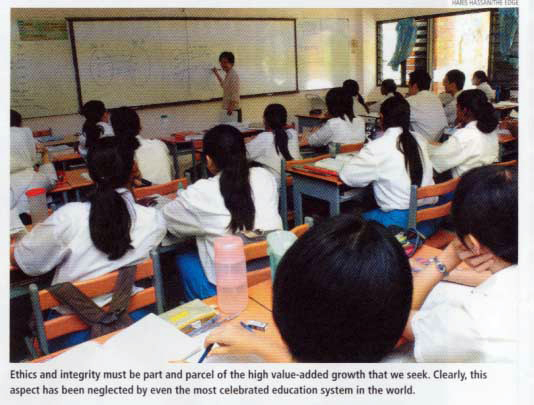MY SAY: Unlocking the 'middle-income trap'
Professor Tan Sri Dato' Dzulkifli Abd Razak
MY SAY
The Edge Malaysia - 08/24/2009
Over the last three decades, Malaysia has been commended for making successful strides in poverty eradication and enhancing the standard of living. Overall, its growth, aided by impressive infrastructure development, has been considered respectable. As a result, Malaysia is now placed in the upper middle-income economic bracket.
The fear now is that it might be trapped in that economic bracket, and hence there is an urgent need to escape from it. Prime Minister Datuk Seri Najib Razak has indicated the desire, within the next decade, "to make the shift to a high-income economy or we risk losing growth momentum in our economy and vibrancy in our markets". He indicated, too, that his policies and priorities will be driven by this overall objective based on innovation, creativity and high value-added sources of growth. Examples cited are education, health tourism, Islamic finance, information and communications technology, creative industries and biotechnology.
Unfortunately, the current state of the global economy is not making the transition any easier. Recently, Najib outlined at least four major challenges that must be met. Firstly, what worked before, in advancing Malaysia into a high-middle-income country, appears to be no longer effective in moving us towards developed-nation status. For starters, while the level of poverty continues to fall, income inequality has widened, in some cases sharply. Secondly, the competitive landscape has changed, and unlike before, we now face intense global competition for capital, talent, knowledge and resources. Thirdly, the global economic crisis has highlighted the importance for us to be a preferred investment destination, given that corporations are consolidating and moving operations to where it is most competitive. Lastly, the intense competition for a smaller pool of investments requires that impediments — whether real or perceived — to investments be removed, and distributional policies be more effectively administered but in a more market-friendly manner.
However, the ultimate challenge is about making fundamental changes in our mindset. In other words, we first need to escape from the mindset that has "trapped" us all. It has often been said that small minds discuss people, average minds discuss events and great minds, ideas! Hence, for innovation and creativity to thrive, we must be able to generate more ideas rather than be preoccupied with "people" and "events" — which seems to be more the case now. Consequently, apart from empty rhetoric and shallow politicking, little is gained as we continue to be ensnared in unproductive discussions. Of late, this seems to have escalated to a nauseating level.
Since minds are generally shaped by the education system, in the final analysis, the question that we have to ask is: how do we make our education system "trap-free"? Put another way, should not the "free spirit of inquiry" be made the overarching philosophy of our education system, where the emphasis is on finding "answers" by asking the right questions that could lead to innovative and creative solutions? This will require an open mindset, free of any built-in trap. That is why to be innovative and creative is easier said than done. It is about the supremacy of ideas, not of authority.

Ethics and integrity must be part and parcel of the high value-added growth that we seek. Clearly, this aspect has been neglected by even the most celebrated education system in the world.
In short, the present education system could act like a trap. Students who pass through are oriented in a stereotyped way as demanded by the employers. While most articulate the need for innovative employees, it is more often within the context of the status quo (read: yesterday's framework). Seldom is it in the transformational sense; so much for moving to the next level. If change is difficult, transformational change, especially in education, is even more so.
What is clear, though, is that if educational transformation fails to materialise because of the absence of deep institutional reforms from the basic to the tertiary level, the current education system will continue to be a powerful hindrance to new skill sets. It will not provide the broad skill base vital for nurturing future dealings with emerging competition.
Take the issue of sustainability or sustainable development. The UN is urging institutions of higher education to pay more attention to this field when defining 21st century education. For this purpose, the UN has declared 2005 to 2014 the Decade of Education for Sustainable Development. It is roping in higher education institutions this time around, given that for more than two decades after the UN Earth Summit in Rio de Janeiro in 1992, little was achieved in the absence of education as the platform for change. This is despite the fact that more than 170 governments supported the recommendations of the Earth Summit.
By recognising education as a vital platform for mindset change, the word "growth" needs to be redefined in shaping the high-income model, if it is to remain viable and sustainable. It is no longer sufficient to talk about an economically sound model, without making it ecologically balanced and socially just. For this to happen, there is a need to write new rules of the game, delineating what the new century is all about. If at all, one vital lesson that the 20th century has taught us is how much we do not know about what we do not know. And the first trap that we must avoid at all cost, moving forward, is the know-all attitude of arrogance.
*Professor Tan Sri Dato' Dzulkifli Abd Razak is Vice-Chancellor of Universiti Sains Malaysia.
